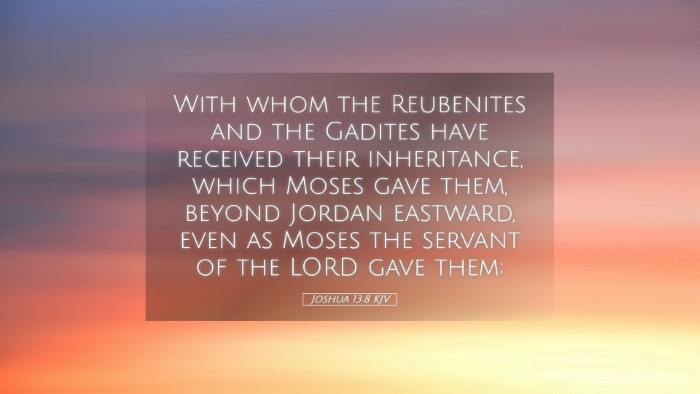Bible Commentary on Joshua 13:8
Verse Reference: Joshua 13:8 - "With whom the Reubenites and the Gadites have received their inheritance, which Moses gave them, beyond the Jordan eastward, as Moses the servant of the Lord gave them." (ESV)
Introduction
This verse finds itself nestled in the broader context of territorial allotment after Israel's conquest of Canaan. The specific focus on the Reubenites and Gadites' inheritance emphasizes the organization of Israel into distinct tribal territories, each granted a unique portion in the Promised Land, reflecting both God’s promises and the leadership of Moses. The commentaries by Matthew Henry, Albert Barnes, and Adam Clarke offer rich insights into the theological implications, historical significance, and practical applications derived from this passage.
Historical Context
Moses, as the leader of Israel, played a significant role in guiding the nation to the brink of the Promised Land after forty years in the wilderness. In this verse, the reference to the Reubenites and Gadites receiving their inheritance "beyond the Jordan" underlines a critical moment in Israel's history, where two tribes opted to settle on the eastern side of the river, an act that posed social and military implications for the nation as a whole.
Insights from Albert Barnes
Barnes stresses the importance of understanding the motivations behind the Reubenites and Gadites' request for land outside Canaan. He notes that their decision stemmed from the rich pasturelands of Gilead, suitable for their livestock. However, he also warns of the potential dangers this choice posed to the unity of the tribes, highlighting the necessary conditions they had to fulfill in supporting their brethren in the conquest of Canaan before settling.
Insights from Matthew Henry
Matthew Henry offers a devotional reflection on this passage, emphasizing obedience and diligence. He argues that although the Reubenites and Gadites received their inheritance, they were not to forsake their responsibilities. Their allocation was conditional upon their commitment to assist in the battles ahead, showcasing a dual theme of belonging and responsibility within the community of faith. Henry encourages believers to consider how their choices impact community and unity within the body of Christ.
Insights from Adam Clarke
Adam Clarke provides a thorough historical and geographical analysis of the regions assigned to the Reubenites and Gadites. He delves into the topography and strategic importance of these territories, emphasizing their military and economic advantages. Clarke also posits that this division illustrates God's meticulous providence in securing the needs of His people, providing for their comfort while reminding them of their obligation to strive for the collective well-being of the nation.
Theological Implications
This verse, while historical in nature, also carries profound theological implications that resonate with the narrative of God's covenantal faithfulness. The inheritance given to the Reubenites and Gadites demonstrates the grace of God in providing for His people in tangible ways. Furthermore, the implications of their settlement raise essential questions about priorities and the call to collective responsibility within the faith community.
Covenant and Promise
The approval of their request by Moses can be seen as a testament to God’s covenant with Israel. The inheritance represented more than just land; it symbolized God's promise to His people, reaffirming His enduring faithfulness. This aspect is crucial for theological reflection on how God provides for His people according to His divine purposes.
Unity and Responsibility
The necessity for the Reubenites and Gadites to support the other tribes in battle highlights a profound lesson on unity in purpose and community. The New Testament echoes this sentiment, underscoring the importance of mutual support and accountability among believers. This calls pastors and theologians to champion the theme of collective responsibility within the church and foster a spirit of partnership in ministry.
Practical Applications
As communities of faith reflect on Joshua 13:8, several practical applications emerge that can enrich the lives of congregants and leaders alike.
- Prioritization of Community: Just as the Reubenites and Gadites were called to prioritize the collective mission over individual comfort, so too are believers challenged to consider how their choices and actions affect the wider community of faith.
- Obedience to God’s Commands: The conditional nature of the inheritance reinforces God’s call to obedience. Pastors are encouraged to teach about the balance between receiving God's gifts and fulfilling our commitments in service to His kingdom.
- Faithful Stewardship: The blessings of land and bounty remind modern believers of the importance of stewardship and responsibility over the resources and gifts God has entrusted to them.
Conclusion
In summary, Joshua 13:8 serves as a poignant reminder of God’s faithfulness to His people and the complexities surrounding personal and corporate responsibility within the body of Christ. The insights from public domain commentaries enhance our understanding of the historical, theological, and practical layers of this text. Pastors, students, and theologians are called to engage with this passage, reflecting on how its truths can be applied to the contemporary church and individual lives.


